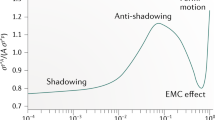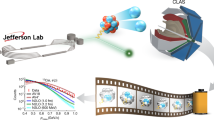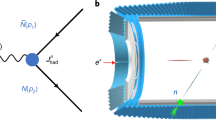Abstract
RECENTLY, multiple nuclear disintegration 'stars', produced by cosmic radiation, have been investigated by the photographic emulsion technique. Plates coated with 50 µ Ilford B.1 emulsions1 were exposed in aircraft for several hours at 30,000 ft. One of these disintegrations was of particular interest, for whereas all stars previously observed had been initiated by radiation not producing ionizing tracks in the emulsion, the one in question appears to be due to nuclear capture of a charged particle, presumably a slow meson.
This is a preview of subscription content, access via your institution
Access options
Subscribe to this journal
Receive 51 print issues and online access
$199.00 per year
only $3.90 per issue
Buy this article
- Purchase on Springer Link
- Instant access to full article PDF
Prices may be subject to local taxes which are calculated during checkout
Similar content being viewed by others
References
Powell, Occhialini, Livesey and Chilton, J. Sci. Instr., 23, 102 (1946). Williams, Proc. Roy. Soc., A, 169, 531 (1938).
Author information
Authors and Affiliations
Rights and permissions
About this article
Cite this article
PERKINS, D. Nuclear Disintegration by Meson Capture. Nature 159, 126–127 (1947). https://doi.org/10.1038/159126a0
Issue Date:
DOI: https://doi.org/10.1038/159126a0
This article is cited by
-
Detection of a strange particle
Nature (2019)
-
Mesons
Experientia (1951)
Comments
By submitting a comment you agree to abide by our Terms and Community Guidelines. If you find something abusive or that does not comply with our terms or guidelines please flag it as inappropriate.



